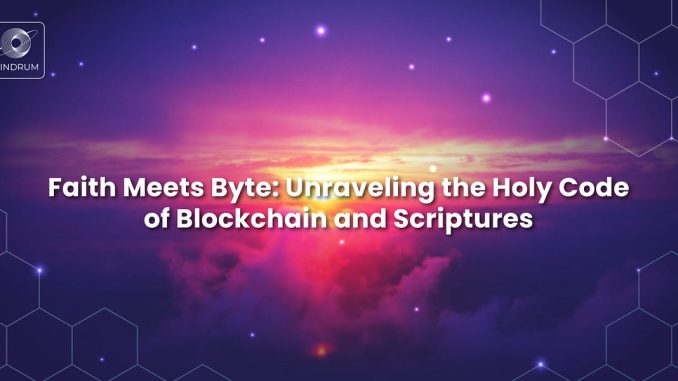
Throughout the time, religion and science have choreographed a dance of discord, from the historic Galileo to contemporary debates on evolution and cosmic creation. This dance revolves around the perceived threat scientific discoveries pose to sacred scripts, challenging religious doctrines entrenched in the binary code of belief. In this techno-theological tango, the million-dollar question surfaces: Can the sacred scripts of religion find harmony with the algorithmic dance of blockchain in our increasingly connected techno-verse?
Blockchain technology, most commonly associated with cryptocurrencies like Bitcoin, is a decentralized and distributed ledger system. Its promise lies in providing transparency, security, and immutability to transactions, disrupting traditional centralized systems. As blockchain finds applications beyond cryptocurrencies — in supply chain management, healthcare, and even voting systems — its impact on society becomes more pronounced.
Religious Perspectives on Blockchain
Examining various religious perspectives on blockchain, it becomes apparent that the technology is neither universally embraced nor rejected. Some see the decentralized nature of blockchain as a reflection of community values, akin to the communal aspects of religious practice. Others, however, may view the anonymity and lack of central authority in blockchain as a potential breeding ground for moral ambiguity.
For instance, in Christianity, the emphasis on transparency and accountability could align with certain aspects of blockchain technology. The immutable nature of blockchain ledgers could be seen as analogous to the unchanging nature of divine principles. On the other hand, concerns about potential misuse and illicit activities may give rise to skepticism.
In Islamic finance, there is ongoing exploration of blockchain applications that adhere to Shariah principles. The emphasis on fairness, transparency, and accountability in Islamic finance aligns with some of the core attributes of blockchain technology.
Two Sides of a Singular Coin
The clash between religion and science may find an unexpected meeting point in blockchain technology. On one side of the coin, the decentralized and transparent nature of blockchain can be interpreted as a reflection of religious values, providing a platform for fair and just interactions. On the flip side, concerns about the potential misuse of blockchain and its detachment from traditional authority structures may sow seeds of skepticism within religious communities.
Some real-life events that happened between the two giants:
CRISPR Babies in China (2018)
In 2018, Chinese scientist He Jiankui claimed to have used CRISPR-Cas9 gene-editing technology to create the world’s first genetically modified babies. This controversial experiment raised widespread ethical concerns globally, touching on issues of informed consent, the potential for unintended consequences, and the ethical boundaries of genetic manipulation.
Blockchain in Religious Organizations (ongoing)
Some religious organizations have started exploring the use of blockchain technology for financial transparency and accountability. The aim is often to build trust among followers by providing a secure and verifiable record of financial transactions. This adoption of blockchain reflects a real-world effort to leverage technology for ethical and organizational purposes within religious contexts.
While real-life conspiracies related to religion and technology may not be as pervasive or dramatic as those portrayed in fiction, there have been instances where concerns about privacy, ethics, and the intersection of religious beliefs with technological advancements have given rise to conspiracy theories. It’s important to note that the term “conspiracy theory” often implies speculative and unverified claims. Here are a couple of examples:
Microchipping and Mark of the Beast
Some conspiracy theories have emerged around the idea of microchipping and its potential connection to religious prophecies. In certain religious circles, there are concerns that emerging technologies, such as RFID (Radio-Frequency Identification) chips, could be linked to the biblical concept of the “Mark of the Beast.” While these concerns are often speculative, they highlight the intersection of religious beliefs and technological developments.
Social Media Manipulation and Religious Polarization
There have been conspiracy theories and concerns about the role of social media platforms in shaping public opinion, including religious beliefs. Some theories suggest that these platforms may be manipulated to exacerbate religious tensions or polarize communities for political or social control. The spread of misinformation and the influence of algorithms on content distribution contribute to these concerns.
Ultimately, the trajectory of religion and technology depends on the adaptability of both entities and the willingness of adherents to embrace or resist technological changes. While coexistence is possible through mutual understanding and adaptation, clashes may occur if the values and principles of one side are perceived as incompatible with the advancements of the other. The future evolution of these giants will likely be shaped by the complex interplay of social, cultural, and technological dynamics.


